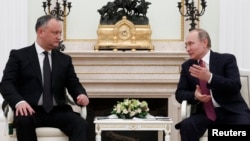Moldova may scrap a trade agreement with the European Union after the country's next parliamentary election, President Igor Dodon said Tuesday during his first state visit to Russia.
Speaking in Moscow at a news conference with Russian President Vladimir Putin, Dodon said it was "curious" that Moldova's trade turnover with the EU had wilted since signing a political and trade pact with the bloc in 2014.
"We gained nothing from this agreement," he told reporters. "We are not against the EU — we have common borders — but you cannot build a relationship on anti-Russia rhetoric," news agencies quoted Dodon as saying after meeting with Putin.
Dodon was elected in November with just over 50 percent of the vote after calling in his campaign for a referendum on Moldova's relationship with the EU, which came at the expense of ties with Russia. No referendum has yet been announced.
Moscow imposed retaliatory trade restrictions on Moldovan farming exports in response to Chisinau's signing of an association agreement with the EU in 2014. Dodon's vow to improve relations with the country's former Soviet master found favor with many Moldovans who have been hit financially by Russia's bans and a broader economic downturn.
Dodon's win and move away from the EU reflects a loss of trust in pro-European leaders in Moldova and Russia's increasingly assertive influence over ex-Soviet states.
Criticism from Plahotniuc
The coordinator of the pro-European ruling coalition in Moldova, Vlad Plahotniuc, said the country would not be pulled out of closer integration with the EU, criticizing Dodon for his comments to Putin.
"Our country does not have the right to send contradictory messages on foreign policy," he said in an online statement. "The Moldovan authorities will not allow the EU association agreement to be annulled. We will not only block any attempts to denounce the agreement, but will speed up the process of its implementation."
In Moscow, Putin struck a both conciliatory and sharp tone with Dodon, saying Russia's neighbors were free to make their own decisions and even court the EU, but Moscow would want its interests to be respected.
"It needs to be recognized that mutually beneficial ties with Russia deteriorated against the background of attempts to force a closer relationship with the European Union," he said.
Dodon's stance on the EU-Russia issue has been mixed since taking office. He has called for early parliamentary elections this year to force out the government, but also said the president "should be neither pro-European nor pro-Russian".
On Tuesday, he said Chisinau did not intend to build an "iron curtain" with the bloc.
Moldova, the poorest country in Europe, is expected to return to growth in the near future after contracting 0.5 percent in 2015. But its exports have yet to recover to pre-crisis levels, falling 4.3 percent in the first quarter of 2016.
Ukraine, another ex-Soviet republic, also played with the idea of closer ties with the EU but abruptly pulled out of a trade deal in late 2013.
The move prompted mass street protests in Kyiv, forcing then-President Viktor Yanukovich from office and paving the road to Moscow's annexation of Ukraine's Crimea region.





